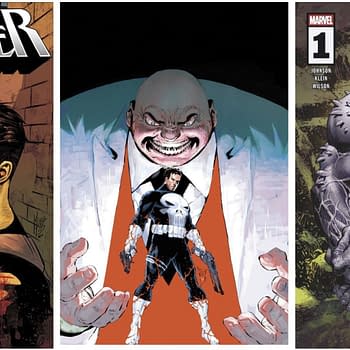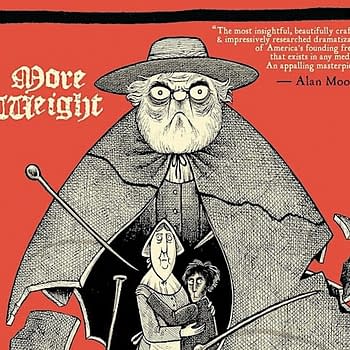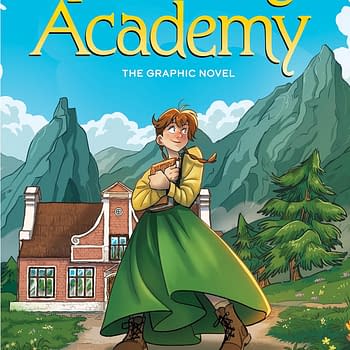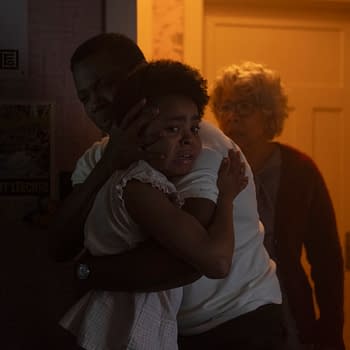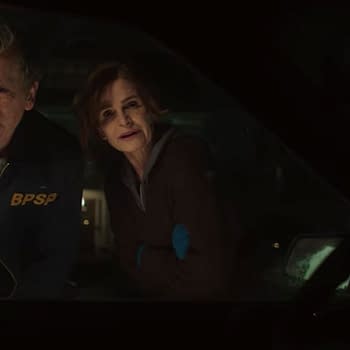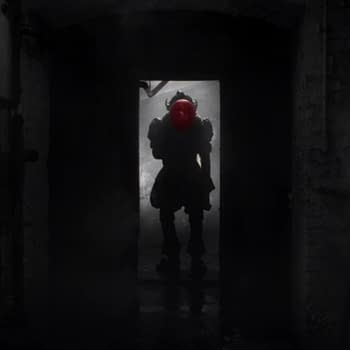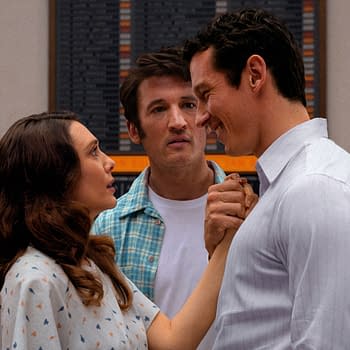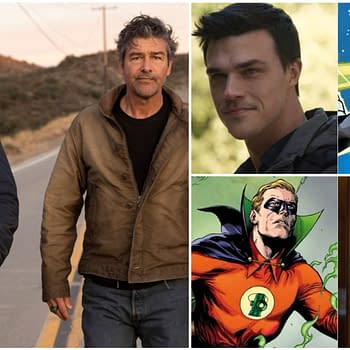Posted in: Movies | Tagged: captain america
Look! It Moves! by Adi Tantimedh #108: The Captain And The Cops – Two Americas

Apart from being the two major releases I watched and played, I found something they both had in common: both presented a particular vision of America.
CALL OF JUAREZ: THE CARTEL has gotten terrible reviews, pretty much beating out DUKE NUKEM FOREVER for the title worst-reviewed video game of the year, and for good reason. Apart from the mediocre first-person shooting gameplay that is a weak copy of the same mechanics of the CALL OF DUTY: MODERN WARFARE series, here pushed to far too repetitive and clumsy extremes as to stop being fun, the part of the game that stood out to me is the story. The plot is a mélange of cod-cynical Drug Wars pulp noir where a Federal task force consisting of an Los Angeles Homicide cop, a Latino Drug Enforcement Agent and a black, female FBI agent are hastily deputisd to protect the daughter of a murdered Vietnam vet who had dealings with a Mexican drug cartel operating right across the border in the city of Juarez. You get to choose which of the three cops to play as: the LA cop who's a descendent of the gunslingers in previous CALL OF JUAREZ games (which I never played), the Latino DEA guy or the sassy black FBI chick who looks so much like Halle Berry she could probably sue the game developers for using her likeness without permission. And you'll discover when you play each character that the cop heroes are utterly dislikable and either morally compromised or outright corrupt: McCall, the homicide cop, has a personal vendetta against the Cartel's right-hand all the way back to Vietnam, Guerra, the DEA guy, has gambling debts and steals drugs to sell on the side, and FBI agent Evans uses her status to keep her last surviving brother out of jail, knowing full well he runs with a gang that deals in drugs and murder. This is game trying to be a substitute for the type of hyperviolent Hollywood blockbuster cop movie that Hollywood doesn't make anymore.
As the plot of the game progresses, the cops essentially become a gang unto themselves as they an wage utterly illegal war on the Cartel, stealing their drug supplies and framing rival gangs to spark off a full-scale gang war, all the while having to kill dozens of stereotypical thugs in the process. In fact, before the game is over, they'll have kill hundreds of people, which is so over the top that, considering the majority are Mexican, makes them borderline-genocidal. The heroes are stereotypes swearing and blinding in the most clichéd ways and the bad guys are also awful stereotypes. The fact that American racism against Mexico is a hot-button issue right now makes the game especially off-colour, with the Mexican government protesting against the game and threatening to ban it, especially the way it portrays the city of Juarez – for a real-life Juarez does exist just across the US-Mexican border – as a virtual ghost town lorded over by drug dealers and smarmy American private military contractors.

 There's an attempt to tell a cynical, downbeat noir plot involving realpolitik, double-crosses and moral compromise, with the usual "corruption goes to the top even on our side" twist, but it is so clichéd, coupled with how ridiculous the characters are that its attempt to have a quasi-tragic ending just falls flat. That they have the homicide cop dress in a cowboy hat and duster throughout the story to try to reinforce the Western theme only amplifies how ludicrous it all is. No American cops or law enforcement official behaves remotely like the heroes of the game without either getting drummed out of the force or winding up in jail with the key thrown away. What's clinches the weirdness of the game is that the developers are Polish. This is a vision of pulp America culled from decades of violent American cop movies and, very specifically, the dark politics of MIAMI VICE, both the TV series and the recent movie. The fantasy of insanely violent American cops who kill every bad guy in the room, the house, hell, the whole town, seems to be the enduring image that has stuck with every foreign country that's ever bought and screened a Hollywood action movie for the last forty years, and then Europeans regurgitate those fantasies and spew them back at America to present a distorted funhouse mirror narrative like CALL OF JUAREZ: THE CARTEL. If I were American, I would feel concerned that this is how Europeans and other people see America. We learn what America is like from pop culture, after all.
There's an attempt to tell a cynical, downbeat noir plot involving realpolitik, double-crosses and moral compromise, with the usual "corruption goes to the top even on our side" twist, but it is so clichéd, coupled with how ridiculous the characters are that its attempt to have a quasi-tragic ending just falls flat. That they have the homicide cop dress in a cowboy hat and duster throughout the story to try to reinforce the Western theme only amplifies how ludicrous it all is. No American cops or law enforcement official behaves remotely like the heroes of the game without either getting drummed out of the force or winding up in jail with the key thrown away. What's clinches the weirdness of the game is that the developers are Polish. This is a vision of pulp America culled from decades of violent American cop movies and, very specifically, the dark politics of MIAMI VICE, both the TV series and the recent movie. The fantasy of insanely violent American cops who kill every bad guy in the room, the house, hell, the whole town, seems to be the enduring image that has stuck with every foreign country that's ever bought and screened a Hollywood action movie for the last forty years, and then Europeans regurgitate those fantasies and spew them back at America to present a distorted funhouse mirror narrative like CALL OF JUAREZ: THE CARTEL. If I were American, I would feel concerned that this is how Europeans and other people see America. We learn what America is like from pop culture, after all.
CAPTAIN AMERICA, on the other hand, is not cynical. The script may be a bit schematic – how can it not be, since nearly all superhero origin stories follow a simllar trajectory? – but it was conceived with genuine affection for the period in history when America and Britain considered themselves at their finest. Many Hollywood movies are, consciously or not, how America would like to present itself to the world and CAPTAIN AMERICA is very much how America would like to see itself: uncomplicated, humble, morally decent, brave and selfless, a paragon of virtue with values borne from a simpler, less complicated time. What's notable about Joe Johnston's movie is that it manages to convey this with rare conviction and genuine wit. It takes a lot of skill and thought to be able to write a character who's uncomplicated and morally good as a compelling hero. Mark Millar could only write the character as an increasingly obnoxious and hawkish right-wing asshole in THE ULTIMATES. Johnson, who also directed the 1991 adaptation of Dave Stevens THE ROCKETEER, has a passion for 1940s period detail and a knowing sense of irony and genre-savvy as he replicates the pacing and energy of 1940s adventure serials with postmodern references acknowledging the original Captain America serials and the jingoistic wartime propaganda origins of the character. Its light sincerity and air of poignancy actually makes this the most moving of the Marvel Comics movies in ways none of the previous ones succeeded in being.
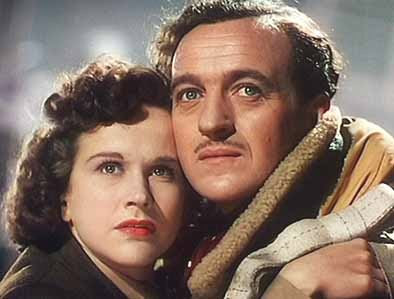
There's an unexpected and possibly unintended subtext in CAPTAIN AMERICA about the cultural interdependency between Britain and the United States. While the characters are American military men stationed in England, the majority of the movie was shot in England, with Liverpool standing in for 1940s Brooklyn and parts of the UK doubling for locations all over Europe where the War was fought, along with British actress Hayley Atwell playing a British military intelligence officer as well as the hero's love interest. In fact, I was pleasantly surprised by the scene at the climax that's an unmistakable homage to Emeric Pressburger and Michael Powell's A MATTER OF LIFE AND DEATH, a film made in wartime celebrating the kinship and alliance between England and America during the War, only there the hero is David Niven's British Air Force pilot and Kim Hunter is the American stationed in England. There are people who consider it one of the greatest British movies ever made, amongst them Martin Scorsese, and I'm inclined to agree.
It might seem unfair to compare a crap video game with a good summer blockbuster movie, but they both present opposition visions of America to the world, based entirely on the America as seen in movies and TV for more than half a century, remixed for contemporary audiences. The contrast between the two of them fascinate me, one a cynical and racially tone-deaf interpretation of American culture by Europeans, the other a sincere love letter to American idealism. If you've read this far, I'm sure you can guess which is which.
Not born in the USA at lookitmoves@gmail.com
Follow the official LOOK! IT MOVES! twitter feed at for thoughts and snark on media and pop culture, stuff for future columns and stuff I may never spend a whole column writing about.
Look! It Moves! © Adisakdi Tantimedh







